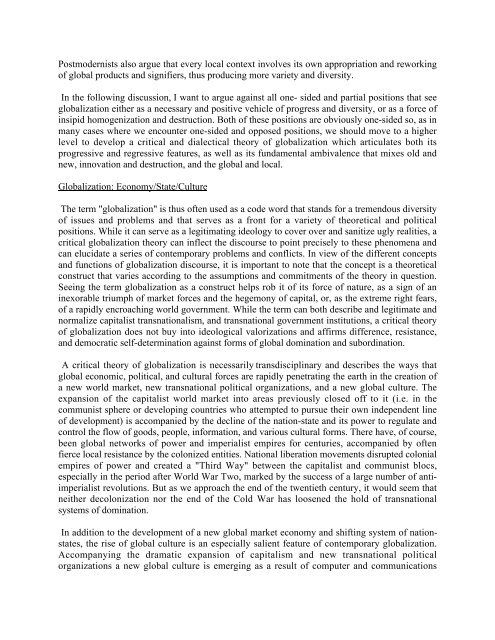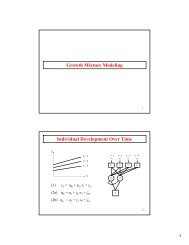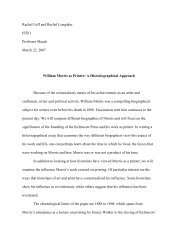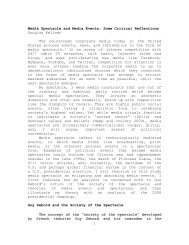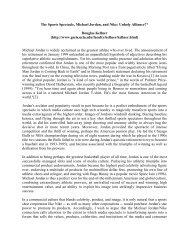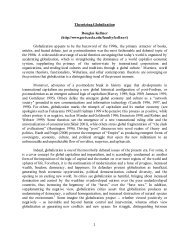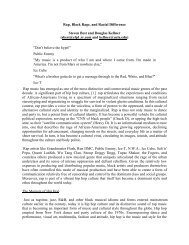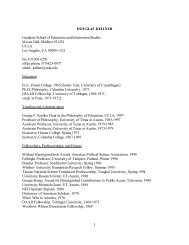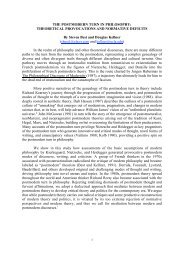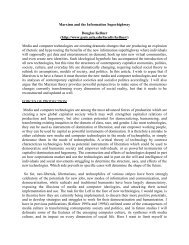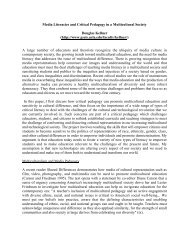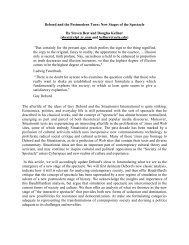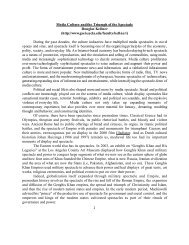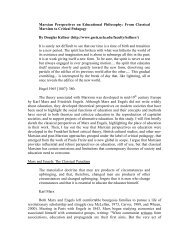Globalization and the Postmodern Turn By Douglas Kellner ... - UCLA
Globalization and the Postmodern Turn By Douglas Kellner ... - UCLA
Globalization and the Postmodern Turn By Douglas Kellner ... - UCLA
Create successful ePaper yourself
Turn your PDF publications into a flip-book with our unique Google optimized e-Paper software.
<strong>Postmodern</strong>ists also argue that every local context involves its own appropriation <strong>and</strong> reworking<br />
of global products <strong>and</strong> signifiers, thus producing more variety <strong>and</strong> diversity.<br />
In <strong>the</strong> following discussion, I want to argue against all one- sided <strong>and</strong> partial positions that see<br />
globalization ei<strong>the</strong>r as a necessary <strong>and</strong> positive vehicle of progress <strong>and</strong> diversity, or as a force of<br />
insipid homogenization <strong>and</strong> destruction. Both of <strong>the</strong>se positions are obviously one-sided so, as in<br />
many cases where we encounter one-sided <strong>and</strong> opposed positions, we should move to a higher<br />
level to develop a critical <strong>and</strong> dialectical <strong>the</strong>ory of globalization which articulates both its<br />
progressive <strong>and</strong> regressive features, as well as its fundamental ambivalence that mixes old <strong>and</strong><br />
new, innovation <strong>and</strong> destruction, <strong>and</strong> <strong>the</strong> global <strong>and</strong> local.<br />
<strong>Globalization</strong>: Economy/State/Culture<br />
The term "globalization" is thus often used as a code word that st<strong>and</strong>s for a tremendous diversity<br />
of issues <strong>and</strong> problems <strong>and</strong> that serves as a front for a variety of <strong>the</strong>oretical <strong>and</strong> political<br />
positions. While it can serve as a legitimating ideology to cover over <strong>and</strong> sanitize ugly realities, a<br />
critical globalization <strong>the</strong>ory can inflect <strong>the</strong> discourse to point precisely to <strong>the</strong>se phenomena <strong>and</strong><br />
can elucidate a series of contemporary problems <strong>and</strong> conflicts. In view of <strong>the</strong> different concepts<br />
<strong>and</strong> functions of globalization discourse, it is important to note that <strong>the</strong> concept is a <strong>the</strong>oretical<br />
construct that varies according to <strong>the</strong> assumptions <strong>and</strong> commitments of <strong>the</strong> <strong>the</strong>ory in question.<br />
Seeing <strong>the</strong> term globalization as a construct helps rob it of its force of nature, as a sign of an<br />
inexorable triumph of market forces <strong>and</strong> <strong>the</strong> hegemony of capital, or, as <strong>the</strong> extreme right fears,<br />
of a rapidly encroaching world government. While <strong>the</strong> term can both describe <strong>and</strong> legitimate <strong>and</strong><br />
normalize capitalist transnationalism, <strong>and</strong> transnational government institutions, a critical <strong>the</strong>ory<br />
of globalization does not buy into ideological valorizations <strong>and</strong> affirms difference, resistance,<br />
<strong>and</strong> democratic self-determination against forms of global domination <strong>and</strong> subordination.<br />
A critical <strong>the</strong>ory of globalization is necessarily transdisciplinary <strong>and</strong> describes <strong>the</strong> ways that<br />
global economic, political, <strong>and</strong> cultural forces are rapidly penetrating <strong>the</strong> earth in <strong>the</strong> creation of<br />
a new world market, new transnational political organizations, <strong>and</strong> a new global culture. The<br />
expansion of <strong>the</strong> capitalist world market into areas previously closed off to it (i.e. in <strong>the</strong><br />
communist sphere or developing countries who attempted to pursue <strong>the</strong>ir own independent line<br />
of development) is accompanied by <strong>the</strong> decline of <strong>the</strong> nation-state <strong>and</strong> its power to regulate <strong>and</strong><br />
control <strong>the</strong> flow of goods, people, information, <strong>and</strong> various cultural forms. There have, of course,<br />
been global networks of power <strong>and</strong> imperialist empires for centuries, accompanied by often<br />
fierce local resistance by <strong>the</strong> colonized entities. National liberation movements disrupted colonial<br />
empires of power <strong>and</strong> created a "Third Way" between <strong>the</strong> capitalist <strong>and</strong> communist blocs,<br />
especially in <strong>the</strong> period after World War Two, marked by <strong>the</strong> success of a large number of antiimperialist<br />
revolutions. But as we approach <strong>the</strong> end of <strong>the</strong> twentieth century, it would seem that<br />
nei<strong>the</strong>r decolonization nor <strong>the</strong> end of <strong>the</strong> Cold War has loosened <strong>the</strong> hold of transnational<br />
systems of domination.<br />
In addition to <strong>the</strong> development of a new global market economy <strong>and</strong> shifting system of nationstates,<br />
<strong>the</strong> rise of global culture is an especially salient feature of contemporary globalization.<br />
Accompanying <strong>the</strong> dramatic expansion of capitalism <strong>and</strong> new transnational political<br />
organizations a new global culture is emerging as a result of computer <strong>and</strong> communications


